

Marzano 13 Teaching Best Practices. As an edtech company, Edmentum certainly believes in the promise of online solutions to improve student outcomes and empower teachers with additional tools to provide effective, individualized instruction.
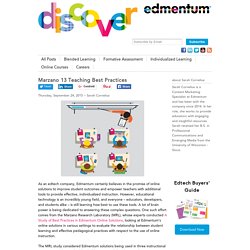
However, educational technology is an incredibly young field, and everyone – educators, developers, and students alike – is still learning how best to use these tools. A lot of brain power is being dedicated to answering these complex questions. One such effort comes from the Marzano Research Laboratory (MRL), whose experts conducted A Study of Best Practices in Edmentum Online Solutions, looking at Edmentum’s online solutions in various settings to evaluate the relationship between student learning and effective pedagogical practices with respect to the use of online instruction. Marzano Dimension One: Strategies involving routine events 1. Clarifying your expectations is key to a smooth-running classroom, whether it’s traditional or virtual. 2. 3. 4. 11 Habits of an Effective Teacher.
2.

Makes a Difference There is a saying, "With great power, comes great responsibility". As a teacher, you need to be aware and remember the great responsibility that comes with your profession. One of your goals ought to be: Make a difference in their lives. How? 3. Bring positive energy into the classroom every single day. 4. This is the fun part and absolutely important for being an effective teacher! 5. Whether you are delivering a lesson, writing report cards or offering support to a colleague - give 100%. 6. Marzano 13 Teaching Best Practices. Seven Educational Challenges We Can All Work to Overcome. 5 Non-Negotiables of Professional Development. This post was originally published on Cooper on Curriculum.
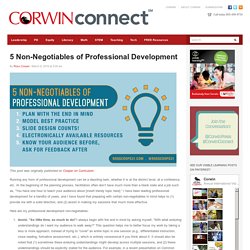
Running any form of professional development can be a daunting task, whether it is at the district level, at a conference, etc. At the beginning of the planning process, facilitators often don’t have much more than a blank slate and a job such as, “You have one hour to teach your audience about [insert trendy topic here].” I have been leading professional development for a handful of years, and I have found that preparing with certain non-negotiables in mind helps to (1) provide me with a solid direction, and (2) assist in making my sessions that much more effective. Why Don’t We Differentiate Professional Development? As I prepare for another afternoon of district-provided professional development activities, I always make sure that I bring plenty of work to do (papers to grade, lesson planning, etc.).
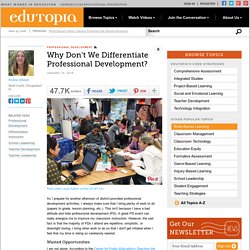
This isn't because I have a bad attitude and hate professional development (PD). A great PD event can really energize me to improve my classroom instruction. However, the sad fact is that the majority of PDs I attend are repetitive, simplistic, or downright boring. Your Rubric Is a Hot Mess; Here’s How to Fix It. Share with Friends 28.1KShares See Mrs.
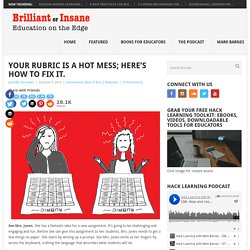
Jones. She has a fantastic idea for a new assignment. It’s going to be challenging and engaging and fun. Then it’s time to build a rubric. See Mrs. If you’re like Mrs. Then, when it comes time to assess student work, you’re likely to find many assignments that don’t fit neatly into any one column. And do students even read these rubrics? Might there be a better way? Instead of detailing all the different ways an assignment deviates from the target, the single-point rubric simply describes the target, using a single column of traits. For some, this alternative might cause apprehension: does this mean more writing for the teacher? With a single-point rubric, the farce of searching for the right pre-scripted language is over, leaving you free to describe exactly what this student needs to work on. The Big List of Class Discussion Strategies. Listen to this article as a podcast episode: Podcast: Play in new window | Download (Duration: 38:22 — 53.1MB) Subscribe: iTunes | Android | When I worked with student teachers on developing effective lesson plans, one thing I always asked them to revise was the phrase “We will discuss.”
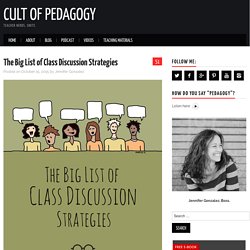
We will discuss the video. Making Lectures More Meaningful to Students. An engaging, thoughtfully presented lecture has the power to inform and inspire students.
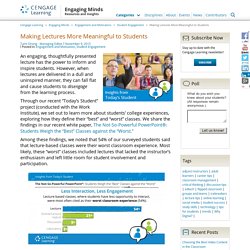
However, when lectures are delivered in a dull and uninspired manner, they can fall flat and cause students to disengage from the learning process. Through our recent “Today’s Student” project (conducted with the Work Institute), we set out to learn more about students’ college experiences, exploring how they define their “best” and “worst” classes. We share the findings in our recent white paper, The Not-So-Powerful PowerPoint®: Students Weigh the “Best” Classes against the “Worst.” Among these findings, we noted that 54% of our surveyed students said that lecture-based classes were their worst classroom experience.
Most likely, these “worst” classes included lectures that lacked the instructor’s enthusiasm and left little room for student involvement and participation. 11 Habits of an Effective Teacher. Carrie Lam , Academic Director, Teacher & Workshop Leader, Canada Posted 07/05/2014 10:12AM | Last Commented 08/12/2016 7:57AM I really appreciate teachers who are truly passionate about teaching.
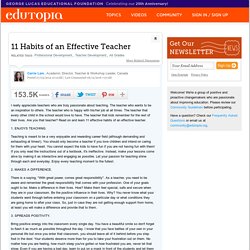
The teacher who wants to be an inspiration to others. The teacher who is happy with his/her job at all times. Welcome to Forbes.